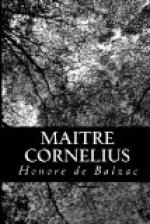When dinner was over, Louis XI. took his daughter, his doctor, and the grand provost, with an escort of soldiers, and rode to the hotel de Poitiers in Tours, where he found, as he expected, the Comte de Saint-Vallier awaiting his wife, perhaps to make away with her life.
“Monsieur,” said the king, “I told you to start at once. Say farewell to your wife now, and go to the frontier; you will be accompanied by an escort of honor. As for your instructions and credentials, they will be in Venice before you get there.”
Louis then gave the order—not without adding certain secret instructions—to a lieutenant of the Scottish guard to take a squad of men and accompany the ambassador to Venice. Saint-Vallier departed in haste, after giving his wife a cold kiss which he would fain have made deadly. Louis XI. then crossed over to the Malemaison, eager to begin the unravelling of the melancholy comedy, lasting now for eight years, in the house of his silversmith; flattering himself that, in his quality of king, he had enough penetration to discover the secret of the robberies. Cornelius did not see the arrival of the escort of his royal master without uneasiness.
“Are all those persons to take part in the inquiry?” he said to the king.
Louis XI. could not help smiling as he saw the fright of the miser and his sister.
“No, my old crony,” he said; “don’t worry yourself. They will sup at Plessis, and you and I alone will make the investigation. I am so good in detecting criminals, that I will wager you ten thousand crowns I shall do so now.”
“Find him, sire, and make no wager.”
They went at once into the strong room, where the Fleming kept his treasure. There Louis, who asked to see, in the first place, the casket from which the jewels of the Duke of Burgundy had been taken, then the chimney down which the robber was supposed to have descended, easily convinced his silversmith of the falsity of the latter supposition, inasmuch as there was no soot on the hearth,—where, in truth, a fire was seldom made,—and no sign that any one had passed down the flue; and moreover that the chimney issued at a part of the roof which was almost inaccessible. At last, after two hours of close investigation, marked with that sagacity which distinguished the suspicious mind of Louis XI., it was clear to him, beyond all doubt, that no one had forced an entrance into the strong-room of his silversmith. No marks of violence were on the locks, nor on the iron coffers which contained the gold, silver, and jewels deposited as securities by wealthy debtors.
“If the robber opened this box,” said the king, “why did he take nothing out of it but the jewels of the Duke of Bavaria? What reason had he for leaving that pearl necklace which lay beside them? A queer robber!”
At that remark the unhappy miser turned pale: he and the king looked at each other for a moment.




